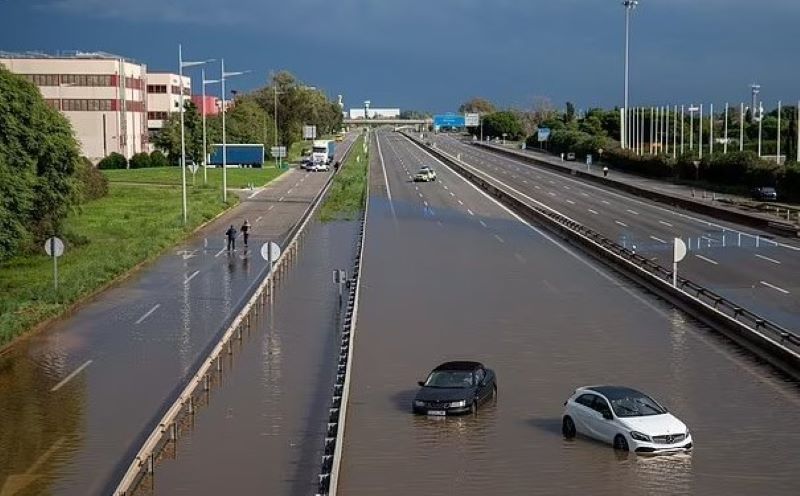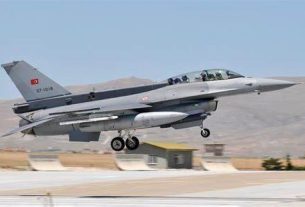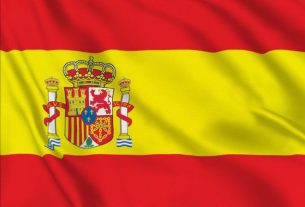The Spanish city of Barcelona has been hit by flooding on Monday, as search and rescue efforts continue following devastating flooding around Valencia last week.
Spain’s state meteorological agency has placed parts of Catalonia on red alert for torrential rain, with local media showing footage of cars partially submerged on a highway.
Parts of the Barcelona’s El Prat airport, the second largest in the country, have been flooded. More than 80 flights have been cancelled or delayed, while rail services have been suspended.
A similar weather event, which hit the Valencia region with a year’s worth of rain last week, has caused at least 217 deaths. On Monday, rescuers focused their efforts on searching for missing people in underground car parks.
The storm caught many victims in their vehicles on roads and in underground spaces, such as car parks, tunnels and garages, where rescue operations are particularly difficult.
It is feared shoppers and workers were trapped inside the car park at a shopping mall in Aldaia, on the outskirts of Valencia, as floodwater overwhelmed the area.
Police have confirmed that no victims were located in the first 50 vehicles inspected at the site.
But reports suggest these vehicles were found near the entrance to the car park, with much of the rest of it still submerged and yet to be explored.
Among the dead were a British couple in their 70s, whose family confirmed they had been found dead in their car days after the flash floods hit Valencia. So far no deaths have been reported in Catalonia.
On Monday morning, Spain’s interior minister refused to say how many were still missing.
European football body Uefa said a minute’s silence would be held at club competition matches “in memory of the victims” and those impacted by the floods. Real Madrid and Barcelona FC are due to play on Tuesday and Wednesday, respectively.
Outside the Bonaire shopping mall in Aldaia, rotting piles of debris lined the roads while noisy generators pumped water from the mall car park.
Spanish police were using drones to get an initial view of the inside, a police spokesperson said.
When the BBC asked a local police officer how much longer the operation would take, he said he could not give an estimate, but that teams would stay as long as necessary.
As is the case in many parts of the region that have been devastated by the floods, there is a vacuum of information.
There has been anger at a perceived lack of warning and insufficient support from authorities after the floods.
On Sunday, the king and queen of Spain were pelted with mud and other objects by angry protesters during a visit to the town of Paiporta – one of the worst-affected in the Valencia region.
Objects were also thrown at Prime Minister Pedro Sánchez, who was quickly evacuated.
The Civil Guard has opened an investigation into the chaotic scenes, Interior Minister Fernando Grande-Marlaska told public broadcaster TVE.
He blamed “marginal groups” for instigating the violence where mud spattered the monarchs’ face and clothes.
In a news conference on Monday, the chief of Spain’s Military Emergencies Unit (UME) said it had pre-deployed 500 troops to Valencia so they could begin working as soon as they were authorised to.
General Francisco Javier Marcos said that when he saw the situation worsen, he sent alerts to 1,000 soldiers, who travelled overnight “so that by dawn the next day, people of Valencia could see that the armed forces were there”.
He added: “You might say we didn’t intervene rapidly. The weather prevented that partially, and secondly, it was a matter of order and discipline.
“You might say that doesn’t justify being slow – well look, you can’t bring more chaos to an already very chaotic situation.”
Local authorities in Valencia have extended travel restrictions for another two days to facilitate the work of the emergency services, cancelled school classes and urged people to work from home.
Gen Marcos said gridlock on some roads was making it hard to distribute food to the 69 affected municipalities.
He said that the number of troops on the ground had been “scaled up” – with 7,800 due by 20:00 local time (19:00 GMT) on Monday. These were being supported by 17,000 volunteers and 5,000 army soldiers offering logistical support, he said.
A warship carrying 104 marine infantry soldiers as well as trucks with food and water docked in Valencia’s port on Monday.
Gen Marcos said the UME was “doing everything we can”, including working double shifts.
He added: “We must be disciplined and we must be patient. I know that’s hard, because pain and emotion means that’s not easy.”
In Catalonia, the Ministry for Ecology said that the State Meteorological Agency (Aemet) had issued a red alert due to the “extreme danger” of torrential rains.
Aemet is warning that up to 8cm of rain could fall across coastal areas into Tuesday morning – but that localised downpours could lead to “very different” accumulations between nearby towns.
The flooding in Valencia was caused by a Dana phenomenon – when warm, moist air meets cold air, creating an unstable weather system.
Scientists say the effects of climate change made the floods worse.__BBC.com





